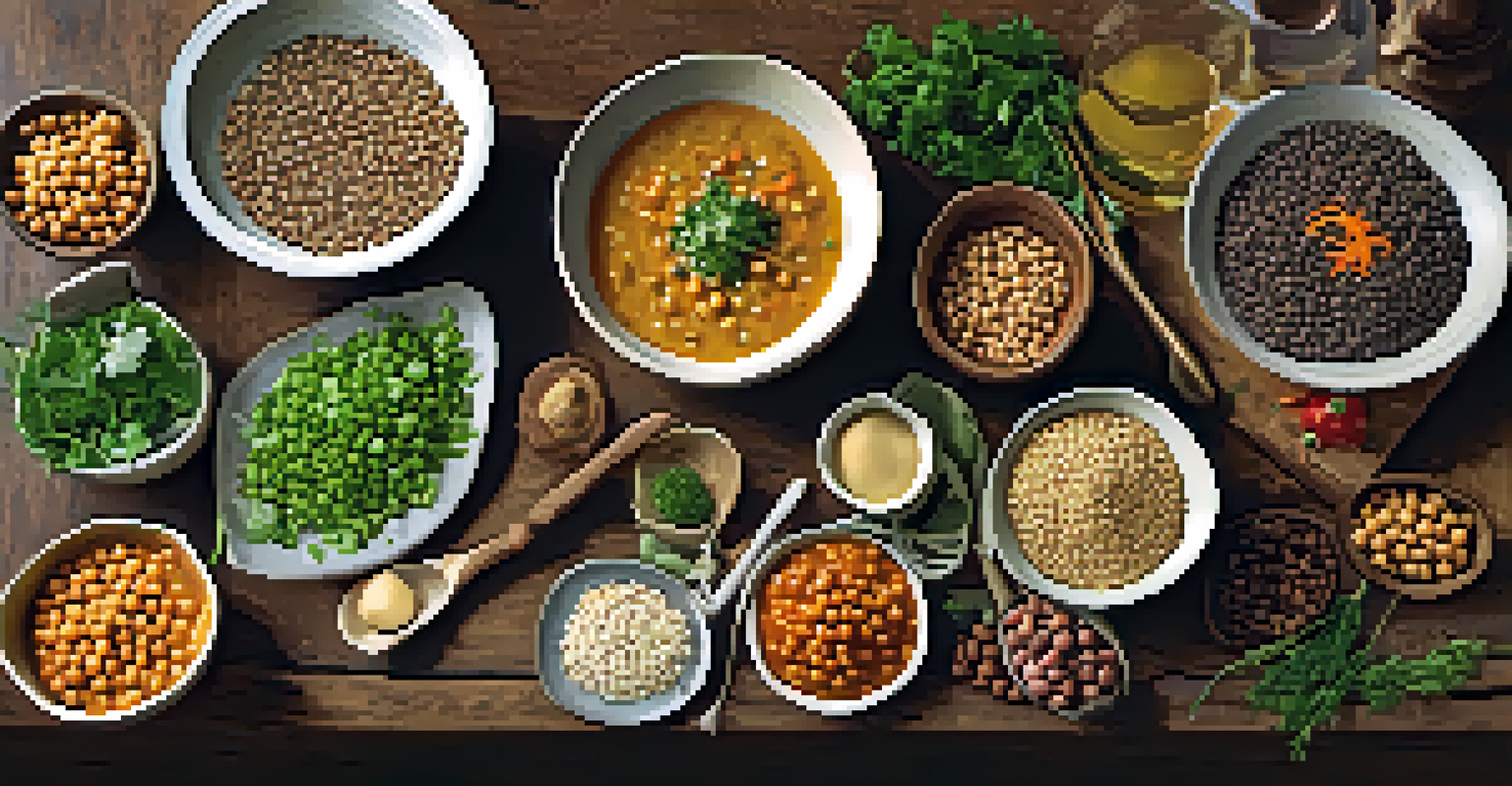Vegetarian Meal Planning for Seniors: Health and Nutrition

Understanding Nutritional Needs for Seniors
As we age, our nutritional needs change significantly. Seniors often require fewer calories but more nutrients to maintain health. This shift makes it essential to focus on nutrient-dense foods, which provide vitamins and minerals without excess calories.
The food you eat can be either the safest and most powerful form of medicine or the slowest form of poison.
For instance, incorporating foods rich in calcium, such as leafy greens and fortified plant-based milks, can help maintain bone health. Additionally, seniors should pay attention to protein intake, which plays a crucial role in muscle maintenance and overall strength.
A well-planned vegetarian diet can meet these needs by emphasizing whole foods like beans, nuts, and seeds. These foods not only provide ample nutrition but also contribute to overall well-being.
Benefits of a Vegetarian Diet for Seniors
Adopting a vegetarian diet can offer numerous health benefits for seniors. Research suggests that vegetarian diets are linked to lower risks of chronic diseases, including heart disease, diabetes, and certain cancers. This is primarily due to higher intakes of fruits, vegetables, and whole grains.

Moreover, a plant-based diet can promote better digestion and weight management, which are vital for maintaining mobility and quality of life in older adults. For example, fiber-rich foods help regulate digestion and can prevent constipation, a common issue among seniors.
Nutritional Needs Change with Age
Seniors require fewer calories but more nutrient-dense foods to maintain health as they age.
Additionally, vegetarian meals tend to be lower in saturated fats, which can support heart health. By choosing meals rich in plant-based ingredients, seniors can enhance their overall health and vitality.
Key Nutrients to Focus on in Vegetarian Meals
When planning vegetarian meals, it's crucial to ensure that seniors receive key nutrients. Important nutrients include protein, vitamin B12, iron, and omega-3 fatty acids. Protein is vital for muscle health, while vitamin B12, often found in animal products, may require supplementation.
Eating a plant-based diet is not just a trend; it's a smart choice for health and longevity.
Iron is another critical nutrient, as older adults are at risk of deficiency. Plant-based sources include lentils, chickpeas, and fortified cereals, but pairing these with vitamin C-rich foods, like citrus fruits, can enhance absorption.
Lastly, omega-3 fatty acids, which support heart and brain health, can be sourced from flaxseeds, chia seeds, and walnuts. Including a variety of these nutrient-dense foods in meals can help meet the dietary needs of seniors.
Meal Planning Strategies for Seniors
Effective meal planning can simplify the process of eating healthy as we age. One strategy is to create a weekly menu that includes a variety of colorful fruits and vegetables, ensuring a broad spectrum of nutrients. For example, planning meals around seasonal produce can make shopping easier and more economical.
Another useful tip is to batch-cook meals in advance. Preparing larger portions of soups, stews, or casseroles can save time and energy during busy weekdays. Plus, having healthy meals ready to go can help prevent reliance on less nutritious convenience foods.
Vegetarian Diet Benefits for Seniors
Adopting a vegetarian diet can lower the risk of chronic diseases and promote better digestion in older adults.
Lastly, involving seniors in meal planning can make it more enjoyable and empowering. Encourage them to choose recipes they love and explore new vegetarian dishes together, making mealtime a fun and engaging experience.
Easy and Nutritious Vegetarian Recipes
When it comes to vegetarian meal planning, simplicity is key. Some easy-to-prepare recipes include vegetable stir-fries, quinoa salads, and lentil soups. These meals are not only nutritious but also quick to make, making them perfect for seniors.
For instance, a colorful vegetable stir-fry can be customized with seasonal produce and served over brown rice or quinoa for added fiber. Similarly, a hearty lentil soup can be made in bulk and frozen for later use, providing a comforting meal option that's always ready.
Encouraging creativity in the kitchen can lead to discovering new favorites, so don't hesitate to try out different spices and ingredients. With a bit of experimentation, healthy vegetarian meals can become both enjoyable and satisfying.
Overcoming Common Challenges in Vegetarian Diets
Transitioning to a vegetarian diet can come with its challenges, especially for seniors accustomed to traditional meals. One common issue is the perception that vegetarian diets lack flavor or variety. However, with the right spices and cooking methods, plant-based meals can be incredibly delicious and diverse.
Another challenge is ensuring adequate protein intake. Seniors might worry about getting enough protein without meat, but there are plenty of sources to choose from, such as beans, lentils, tofu, and tempeh. Incorporating these into daily meals can help alleviate concerns regarding protein deficiency.
Key Nutrients for Vegetarian Meals
Seniors should focus on essential nutrients like protein, vitamin B12, and omega-3 fatty acids in their vegetarian meals.
Lastly, it's essential to address potential concerns about getting enough vitamins and minerals. Regular check-ups with healthcare providers can help monitor nutrient levels and guide dietary choices, ensuring seniors remain healthy and vibrant on their vegetarian journey.
The Role of Supplements in a Vegetarian Diet
While a well-planned vegetarian diet can provide most nutritional needs, some seniors might still require supplements. Vitamin B12 is particularly important, as it is primarily found in animal products. Seniors following a vegetarian diet may need to consider a B12 supplement or fortified foods to meet their requirements.
Similarly, vitamin D is crucial for bone health, especially in seniors, and can be obtained from sunlight or fortified foods. If exposure to sunlight is limited, a vitamin D supplement might be beneficial.

Lastly, if omega-3 fatty acids from fish are lacking in the diet, seniors can explore algae-based supplements. Consulting with a healthcare provider can help determine if supplements are necessary and which ones would be most beneficial.